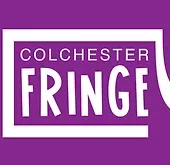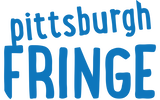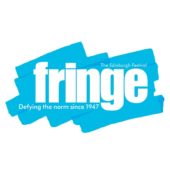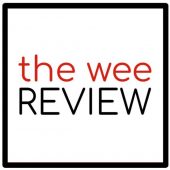In this interview, Mairi Oliver from Lighthouse Bookshop on West Nicholson Street talks to Erin Williamson about creating and curating the free Book Fringe (from Lighthouse, Argonaut and Typewronger bookshops) and what it’s like to be a year-round Edinburgh bookshop and event space operating in the centre of the Fringe in August. Lighthouse book events run at 1pm in the shop for the duration of the festival and are available to view on their website.
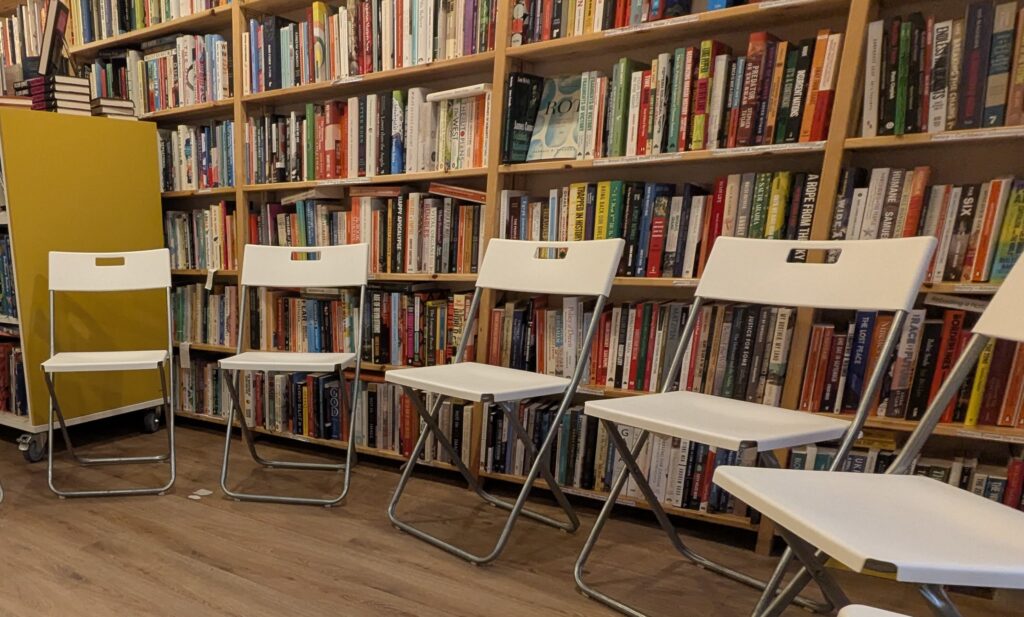
Erin and Mairi are talking about the book fringe. (Edited transcript).
Could you tell us a little bit about book fringe, please?
Mairi Oliver: Book fringe is to the Edinburgh International Book Festival, what Fringe is to the International Festival. And it comes out of that same tradition of going, you know, there are some spaces that are backed by funding and structures and are these moments that arrive once in the year. And then there’s the whole ecosystem of creativity, and in our case, writers and readers that exist the whole year round. And our Fringe centres books and writers and that sort of bookshop life. Book fringe at the moment, exists across three different bookshops. So we call it the ALT edition, A for Argonaut Books down at the bottom of Leith Walk, L for Lighthouse, T for Typewronger. And there might be different editions. We had a Pollinations edition a few years ago, which was all sort of environmental in nature, with another outside group. So, the book fringe gets to metamorphose into whatever the year needs it to be. But in essence, it’s this idea of bringing big name authors, or bringing local talent and indie presses and that very independent bookshop feeling in the middle of festival chaos, into intimate bookshop settings, so that readers get to connect in that space in a way that’s much less formal, much less structured, that’s free, that you can sort of wander in and bring that fringe feeling to a book event, yeah,
Erin Williamson: With Lighthouse, it’s always lunch-times 1pm and you are free to wander in. You can get a ticket in advance, but you can also just turn up. Like the one I went to, there were a couple of spaces left. It was that pleasant amount of full, where you could literally just sit down and be there, but you can also buy a ticket in advance if you’ve got it on your itinerary. You’re seconds, absolute seconds from venues, from chaos, from flyering, and it is still a little bit calm and thoughtful in there. You’re managing to keep the calm.
Mairi: I like that. Sometimes it feels like there’s a tension in festival time to try and be as manic and chaotic and all the things that the festival feels like, like that buzz. But I feel like we want to hit the balance between that and a library, where people feel like they have to be hushed and respectful to the books, and we’re kind of in the middle. I think bookshops allow that space for people to slow down, and it’s a space of conversation. And so even though we still have some of the music from The Pear Tree and you can hear the flyering for The Counting House across the road. There’s a little bit of that as background noise, which makes it feel like you’re still in the middle of the Fringe. But then there’s this space, like you say, that’s supposed to be … slow down and just hear writers talk about books and bookie things.
Erin: And there’s also that conversation that’s going on with the festival in general, that comes through with all of the speakers. They’re here, experiencing the festival. And a lot of the ideas that you get in your events are the ideas people are taking into performance spaces as well. So it’s a really nice companion to both the International Book Festival, and then also all of the Fringe that’s happening across so many different genres.
Could you tell us about your programming? What have you been excited by so far? And what is coming up?
Mairi: So the programming, in that very indie bookshop spirit of things, it’s decentralised. Each of the bookshops programme according to what we think our readers are interested in, but also what feels like fits the vibe of the shop, especially in this slightly weird month. And so we all go away and programme our own thing, and then we sort of centralise a programme: Typewronger has a poster that is designed by the team at Argonaut, and then the programme is printed by Typewronger at their studio in Edinburgh palette.
You’ll notice different things like the Lighthouse programme leans into more political fare. So yesterday, the event that you were at, Paula Akpan and Katie Goh are two writers who have written a sort of fusion between history and memoir in order to unpack ideas of how we draw belonging from history, how history lives in the present, and the idea of rootedness. And they’ve come from wildly different things, and they came to the event by being like, “we both have beautiful blue books that were out on the same day”, and yet the books are also in conversation.
So that was yesterday, and there was this beautiful energy in the room that was connecting these histories to this moment that feels incredibly trying because of everything that’s happening in Gaza. We’ve had a comedian, we had a conservationist, Ruby Free on Sunday. And then coming up, we have a Palestinian and a Jewish writer in conversation today, Mahmoud Muna and Matthew Teller. We have a lot of politics, a bit of history. Most of our queer stuff is in the second half of the month. Typewronger’s programming is lots of indie presses and micro-presses, and they’re doing a Gutter event and a Blue Diode event, and they do more of the poetry.
We try to avoid poetry because it’s hard to have a really poignant poem be interrupted by an Amy Winehouse tribute act at the Pear Tree. We do less of the delicate fair. And then Argonaut has loads of good stuff. They had Chris Kohler yesterday. They have Rachelle Atalla coming up, Caroline Eden. They do more fiction, but also that kind of genre-bendy literary fiction that they do so well the rest of the year. There’s a bit of everything. Whatever your book poison is, there will be something for you. And as you say, we programme at different times. Lighthouse’s events are always at 1pm, the others do evenings, afternoons and workshops. We try not to programme stuff at the same time.
Erin: And there’s something for everyone. There’s also something at a location for everyone. Typewronger is quite close to the St James Centre – so just as you’re leaving fringe chaos, and then you’ve got Argonaut out near the Foot of the Walk. So really getting just a little bit more calm and a little bit more sea – you head all the way along Leith Walk. You’ve got a really nice spread for how people are doing.
Mairi: I think that’s sort of also reflective of Book Fringe because it used to just be Lighthouse books, and then it felt like it was something that could exist across the city and could be a way of showcasing this, like, bookish, literary ecosystem that exists all year round. And I think it’s also really fitting that the Edinburgh Art festival has spilled into Leith now, and they’ve got some amazing stuff going on not far from Typewonger. Welcome to the Fringe Palestine is happening in Portobello, down the road from Portobello Books who we’re hoping might join our book fringe posse next year. It’s good to have programming that reflects different needs, geographies, where people are in the city, what they have capacity for, and you can dip into different things. And because it’s free in a month where going to a lot of shows is really expensive, the idea is to try and make sure that people can still access those things.
Erin: And also a chance to see people, if you haven’t managed to see them at the official book festival. The acts yesterday are speaking at the Edinburgh Book Festival. And then Pierre Novelli, if you didn’t catch his stand-up here he is in a different form. So it’s just a slightly different angle to experience some of the same things.
Mairi: Yeah, I like that. It’s the slightly off-kilter, ramshackle, indie bookshop version of the polished book event. There was an event a few years ago at book fringe with Elif Shafak that felt like it really captured that sort of spirit. She had this big, you know, hundreds of people in a big tent in a formal book event, Edinburgh Book Festival way. And it was a beautiful event, chaired, an hour. People walk in, and the doors are closed behind you and you have an hour in this environment. Then you walk out, and you join a signing queue with hundreds of people. And then a couple of days later, she had her book fringe event, which was 30 minutes in the middle of the afternoon, and there were this group of Turkish women who had arrived with their children, and the kids were crawling under the chairs, and one of them came and sat right beside Elif while she was talking. And then lots of people were talking in Turkish, and hadn’t seen each other in a while. People had loads of questions, and were leaning against bookcases as we crammed everyone in like sardines. It was just a completely different way of experiencing it. So it’s not about saying one is better than the other. As you say, they’re different things, and people go to both. Here’s a different way of experiencing an author where they’re not at a remove on a stage separate from you. They are in community with you right here, whoever they might be.
Erin: Yeah, yeah. And even sometimes, a different way of experiencing an idea. I was really aware, with Katie Goh’s book yesterday, she was talking about oranges. And it was like, having seen a lot of theatre and new writing and physical theatre, I was like, that would make a great dance. That idea of oranges: you can draw it across continents, across metaphors. It’s like this unfolding of ideas that it does. It just works. There’s a place for people to talk about their book. And whatever you’ve seen in the last couple of days, you will draw new connections and experience it in a different way.
Mairi: And there’s a freedom for the authors to come to us with what they want to do. I think across all of them – Typewronger events tend to be slightly more off the wall, but yeah, the kind of conversations that are happening, the hope is that they’re reflective of the space that you’re in. I think most of Pierre Novelli’s event last week, he talked for about five minutes before the audience’s hands shot up, and it was just 30 minutes of chatting about neurodivergence, autism, and the Fringe from people who were also performers. And every day of the Fringe will be different in that.
Erin: That’s amazing. Thank you so much for talking to us, Mairi. The Book Fringe – the ALT Book Fringe, if you want to remember the three bookshops- is running throughout August. Go check it out, spend your lunchtime in Lighthouse.
Visit the book fringe https://lighthousebookshop.com/events/book-fringe-2025-alt-edition-returns








